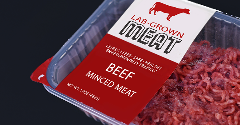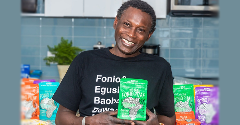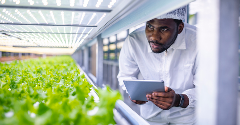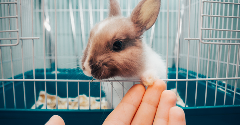News
Brands and retailers find ways to reduce food waste
12 Oct 2022From supermarkets selling imperfect ‘wonky’ vegetables to drinks brands using upcycled barley for plant-based milks, retailers and manufacturers alike are finding ways to reduce food waste across the value chain.
Despite efforts by grocery retailers and manufacturers, food waste continues to blight the food industry with over 88 million tonnes of food thrown away annually in Europe.

A societal, environmental, and business priority
An article by global management consulting firm McKinsey & Company has shed more light on this topic, making the case that tackling food loss is a “societal, environmental, and business priority.”
Reducing food loss is immensely achievable, its authors state encouragingly, suggesting that united efforts amongst all participants in the value chain could cut food loss by 50 to 70%.
Two-thirds of the food that would otherwise be lost could be redirected to human consumption; the remaining one-third would go to alternative uses, such as bio-based materials or animal feed, they add.
Some efforts are already being made to add value to such produce. Online companies such as Imperfect Foods and Misfits Market sell imperfect produce that cannot be sold to grocery stores while traditional brick-and-mortar supermarkets Lidl and Morrisons have rolled out “wonky vegetable” campaigns in their supermarkets in the UK, selling imperfect produce.
In 2021, AB InBev's Anheuser-Busch revealed it would invest $100 million to expand Evergrain, its subsidiary’s production capabilities to recycle waste barley and repurpose it for use in food and beverages.
Shifting food loss thinking
“Taking food loss and turning it into value could be beneficial, which is what AB InBev is doing by supporting their product creation of taking barley by products and turning them into a protein and fibre ingredient,” said Turner Wyatt, CEO at Upcycled Food Association, in a recent post.
“Food loss is not due to one person’s choices and it’s certainly not one person’s responsibility to solve, but that we must all come together and shift the way we think about food loss, food waste, and the opportunities to address them.”
So, what can grocery retailers and manufacturers do to reduce food loss? Well, firstly it involves a shift in mindset to think of food loss as an operational inefficiency that affects the business as a whole.
This mindset could then evolve beyond satisfying sustainability targets and towards opportunities that benefit the business supply chain by improving both the top and bottom lines.
To put that into practice is the next step, with companies requiring a new communicative approach with stakeholders in the food ecosystem and consigning business-as-usual practices as those of yesteryear.
Enormous potential to add value to sidestreams
According to the authors of McKinsey’s report, AB InBev’s investment is a great example of turning food loss into value.
By turning its barley by-products into a protein and fibre ingredient, a dairy-free protein drink and a protein ingredient was produced and made commercially available by the drinks firm.
“There is enormous potential to sell more of the food that farmers produce,” says the report. “Food that would otherwise be lost can be turned into new products and thriving businesses. Consider dedicating R&D resources to developing new revenue streams from nonmarketable food.”
Related news

Israel approves Aleph Farms’ cell-cultured beef in world first
1 Feb 2024
Israel has granted the first regulatory approval for the commercial sale of cultivated beef, joining the US and Singapore in officially recognising cultivated meat’s role towards protein diversification.
Read more
Fazer and Solar Foods launch snack bar made with air protein
30 Jan 2024
Finnish food manufacturer Fazer has teamed up with foodtech startup Solar Foods to launch a limited-edition snack bar in Singapore made using a novel, carbon-fed microbial protein.
Read more
Big brands invest in precision fermentation-derived palm oil
25 Jan 2024
Although still not approved for food applications, big brands such as Unilever and Doehler are investing in precision fermentation-derived palm oil in a bid to reduce the environmental impact associated with this conventional palm oil.
Read more
Supergrain fonio expands its reach in US market
11 Jan 2024
More US consumers will find nutritious, climate-smart grain fonio in supermarkets thanks to a new distribution structure for the import’s most prominent commercial brand, Yolélé.
Read more
Sustainability meets innovation at Fi Europe 2023's Sustainability Ingredients Zone
9 Jan 2024
Fi Europe’s Sustainable Ingredients Zone showcases ingredients forging a path toward a greener future. Three innovators are redefining what sustainability within the food and beverage industry means, with upcycled products, regenerative agriculture, an...
Read more
Supermarkets innovate with private label plant-based ranges
9 Jan 2024
Plant-based product ranges are an important part of retailers’ private label innovation efforts – and represent an important way for supermarkets to reduce their environmental impact.
Read more
The UK prepares to open food security science centre
2 Jan 2024
Amid global food insecurity, the UK government says it is committed to producing crops resilient to climate change and addressing hunger and malnutrition with a food security science centre.
Read more
Novel food safety platform could eliminate animal testing
21 Dec 2023
The European Food Safety Authority (EFSA) has introduced a new platform that has the potential to eliminate animal testing in the food industry.
Read more
Water-conscious consumers, upcycled food, and tech-driven sustainability: Highlights from Fi Europe, part 2
14 Dec 2023
With climate change becoming a tangible reality, consumers’ environmental concerns are changing. At Fi Europe, market analysts revealed how people are now interested in everyday issues like water shortages and tech-driven solutions such as GM drought-r...
Read more
The food industry’s single-use packaging problem
12 Dec 2023
The food industry’s reliance on single-use packaging is a sustainability “sticking point” with viable alternatives not widely available – but new EU rules mean food businesses will remain responsible for the collection and disposal of the packaging the...
Read more